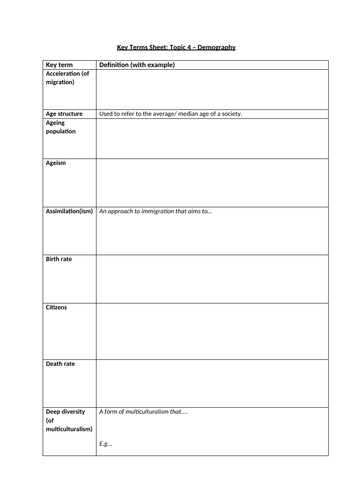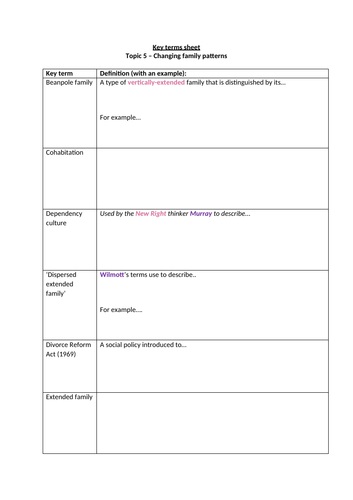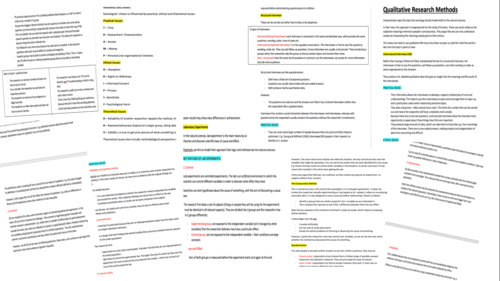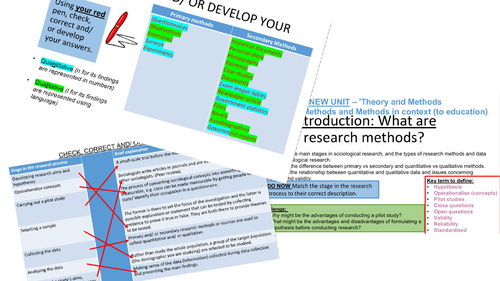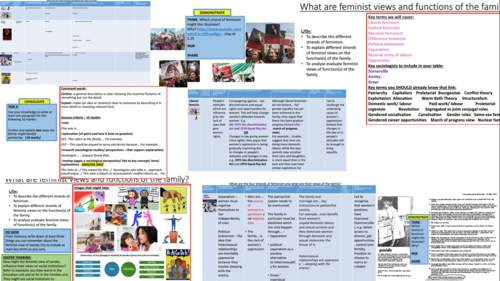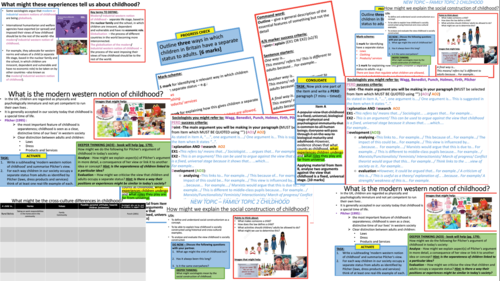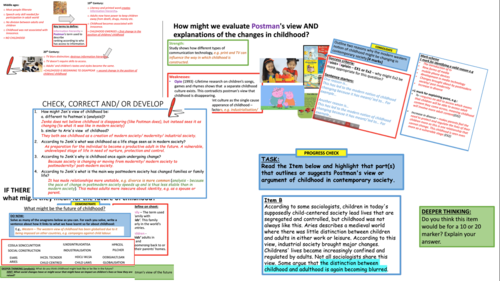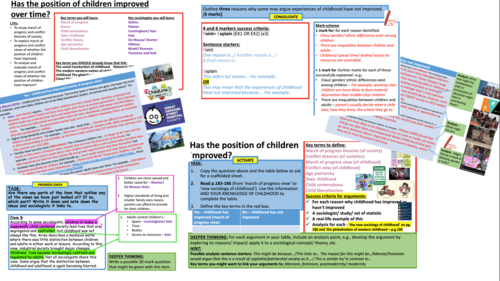
162Uploads
20k+Views
4k+Downloads
Sociology

KEY TERMS SHEET - AQA A-level Sociology Families: Topic 4 Demography
Alphabetical key term sheet for AQA A-level Sociology Family Topic 4 Demography that requires students to fill out the definitions themselves. Includes some sentence starters and two definitions for more difficult key terms.
Good form of revision for students and can be used as a revision resource to develop AO1 once filled out.
**BASED ON CONTENT in textbook - AQA A Level Sociology Book One Including AS Level: Book one 3rd Revised edition by Rob Webb, Hal Westergaard, Keith Trobe, Annie Townend ’ textbook

AQA A-level Sociology: Education Topic3 Ethnic differences -Material deprivation & racism in society
Detailed and differentiated (up and down) student led lesson on how a. material deprivation and b. racism in wider society might cause ethnic differences in achievement. Makes reference to key terms material vs cultural factors, external vs internal factors, the meaning/ patterns of ethnic differences in achievement.
Uses and refers to ’ AQA A Level Sociology Book One Including AS Level: Book one 3rd Revised edition by Rob Webb, Hal Westergaard, Keith Trobe, Annie Townend ’ textbook
RESOURCES CAN BE FOUND AT THE END OF THE PPT.
ANSWERS FOR MAIN ACTIVITIES CAN BE FOUND ON NEXT SLIDE AFTER ACTIVITY SLIDE
INCLUDES ORACY ACTIVITY

KEY TERMS SHEET - AQA A-level Sociology Families: Topic 5 Changing family patterns
Alphabetical key term sheet for AQA A-level Sociology Family Topic 5 Changing family patterns that requires students to fill out the definitions themselves. Includes some sentence starters for more difficult key terms.
**Good form of revision for students and can be used as a revision resource to develop AO1 once filled out. **
**BASED ON CONTENT in textbook - AQA A Level Sociology Book One Including AS Level: Book one 3rd Revised edition by Rob

AQA A-level Sociology: Families Topic 5 ‘Changing family patterns’ Revision lesson
Detailed and differentiated (up and down) student led lesson that
recaps changing family patterns learnt of Family Topic 5 and the reasons for them.
allows students to develop their AO2 (application) and AO3 (analysis) skills by considering the relationship changing family patterns might have with other aspects of the topic, as well as other topic in families and household, such as the domestic division of labour (couples), experiences of childhood (childhood), the characteristic of populations (demography).
***This part of the lesson is very helpful for developing the skills students need for to answer ‘Outline and explain’ 10 markers which requires students to demonstrate the ability to connect two elements, aspects, subtopics, or topics to answer the question. *
concludes by requiring students to apply this knowledge to ‘outline and explain’ 10 markers and one item 10 marker.
RESOURCES CAN BE FOUND AT THE END OF THE PPT.
ANSWERS FOR MOST OF THE ACTIVITIES CAN BE FOUND ON NEXT SLIDE AFTER ACTIVITY SLIDE

KEY TERMS SHEET - AQA A-level Sociology Education: Topic 3 Ethnic differences in achievement
Alphabetical key term sheet for AQA A-level Sociology Education Topic 3 ethnic differences in achievement that requires students to fill out the definitions themselves.
*** Includes scaffolding, e.g. some sentence starters (to model to students how to incorporate key sociologists into their definitions) and prompts to help students remember how key term links to the topic. **
*** Includes a section with key terms that students should know from previous learning(links to key terms covered in class differences in achievement, e.g. labelling, pupil identities, material deprivation, speech codes etc) that link to this topic. **
DOES NOT INCLUDE IN TABLE key terms covered in Topic 1 & 2 Class diff key term sheet.
Good form of revision for students and can be used as a revision resource to develop AO1 once filled out.
**BASED ON CONTENT textbook - AQA A Level Sociology Book One Including AS Level: Book one 3rd Revised edition by Rob Webb, Hal Westergaard, Keith Trobe, Annie Townend ’ textbook

KEY TERMS SHEET - AQA A-level Sociology Education: Topic 4 Gender differences in achievement
Alphabetical key term sheet for AQA A-level Sociology Education Topic 4 Gender differences in achievement that requires students to fill out the definitions themselves.
*** Includes some prompts to help students remember how key term links to the topic, *e.g. divides key terms into those use in: gender differences in achievement, gender differences in subject choice and pupils’ sexual and gender identities ***
*** Includes a section with key terms that students should know from previous learning (links to key terms covered in class differences in achievement, e.g. labelling, pupil identities, etc) that link to this topic. **DOES NOT INCLUDE IN TABLE key terms covered in Topic 1 & 2 Class diff key term sheet.
Good form of revision for students and can be used as a revision resource to develop AO1 once filled out.
**BASED ON CONTENT textbook - AQA A Level Sociology Book One Including AS Level: Book one 3rd Revised edition by Rob Webb, Hal Westergaard, Keith Trobe, Annie Townend ’ textbook

KEY TERMS SHEET - AQA A-level Sociology Education: Topic 1 Class differences in achievement (ex)
Alphabetical key term sheet for AQA A-level Sociology Education Topic 1 Class differences in achievement (external factors) that requires students to fill out the definitions themselves.
*** Includes scaffolding, e.g. a few sentence starters (to model to students how to incorporate key sociologists into their definitions)
*** Includes a section with key terms that students should know from previous learning(links to key terms covered in class differences in achievement, e.g. labelling, pupil identities, material deprivation, speech codes etc) that link to this topic. **
Good form of revision for students and can be used as a revision resource to develop AO1 once filled out.
**BASED ON CONTENT textbook - AQA A Level Sociology Book One Including AS Level: Book one 3rd Revised edition by Rob Webb, Hal Westergaard, Keith Trobe, Annie Townend ’ textbook

KEY TERMS SHEET - AQA A-level Sociology Education: Topic 2 Class differences in achievement (in)
Alphabetical key term sheet for AQA A-level Sociology Education Topic 2 Class differences in achievement (internal factors) that requires students to fill out the definitions themselves.
*** Includes scaffolding, e.g. a few sentence starters (to model to students how to incorporate key sociologists into their definitions)
*** Includes a section with key terms that students should know from previous learning.
Good form of revision for students and can be used as a revision resource to develop AO1 once filled out.
**BASED ON CONTENT textbook - AQA A Level Sociology Book One Including AS Level: Book one 3rd Revised edition by Rob Webb, Hal Westergaard, Keith Trobe, Annie Townend ’ textbook

AQA A-level Sociology: Education Revision Notes
Detailed revision notes that covers all topics (1-6) in education:
Class differences in achievement (internal and external factors)
Ethnic differences in achievement (internal and external factors)
Gender differences in achievement, subject choice and experiences in school (internal and external factors)
Role of education
Educational policy
Includes an evaluation point for most if not all arguments.
NOT EDITABLE - PDF document
Includes contents page

AQA A-level Sociology: Research Methods Revision Notes
Detailed revision notes for ‘Methods’ part of ‘Theory and Methods’ that outlines the practical, ethical and theoretical PET issues (and strengths) on the following research methods:
Experiments (the different types)
Questionnaires
Interviews (the different types)
Participant observation
Official statistics
Documents
A2 CONTENT FOR YR 13s
NOT EDITABLE - PDF doc

Sociology Education Class differences in achievement - Assessment & Feedback lesson
Asessment questions for A-level Sociology (4, 6, 10, 30 markers) AND detailed and differentiated (up and down), student led feedback DIRT lesson that explores recaps how to answer4, 6, 10 & 30 markers and provides answers for assessment. Includes student friendly success criteria AND mark-schemes.
ANSWERS TO MAIN ACTIVITIES AND EXAM QUESTIONS ARE INCLUDED
**Made for AQA A-level but can be easily be changed and used for AS Level and other specs, or differentiated down for GCSE) lesson **

Sociology Research Methods - Introduction to research methods
Detailed and differentiated student-led lesson that explores primary vs secondary methods, quantitative vs qualitative methods, validity and reliability as a way to introduce students to the main main research methods. LESSON COMES WITH ANSWERS
Can be used for ANY SPEC and GCSE but catered towards A-LEVEL AQA sociology** .
Comes with key term sheet for the lesson.

Introduction to Yr 13 Sociology
Introduction lessons that outlines the AQA A-level course, expectations, revision resources and guidance. Rest of lessons enables students to recap the AOs, ways they might develop and/ or demonstrate in. Students are directed to create AO specific goals and action plans to meet each. Lesson also teaches students how to highlight with purpose. Comes with worksheet and ANSWERS for activities.
Can be differentiated down for GCSE and can be edited to make applicable for ANY SPEC.

AQA A-Level Sociology PLCs (ALL UNITS) - EDITABLE
NOW EDITABLE - on a word document
Personal Learning Checklists for the following AQA A-level Sociology syllabus:
Education
Family
Religion
Media
Crime
Theory and Methods (includes separate PLCs for each sub-topic and a combined PLC.
Methods in context

AQA Sociology Crime and Deviance Workbooks: Topics 1-7
Workbooks for the AQA A-level Sociology Crime and Deviance unit. The workbooks cover topics 1-7 and should be used with the Webb, Westergaard, Trobe and Townend Book 2. The workbooks are made up of comprehension questions to help students engage with the content. Students would be expected to answer the quetsions in the booklet whilst reading the textbook. The workbooks enable students to engage with key terms by using the glossary at the back of the textbook. Workbooks also include some challenge questions that allow students to make links to other topics in the unit and course.

AQA A-level Sociology Families: Theories of the family – Feminist views of the family (UPDATED))
Detailed and differentiated (up and down) student-led lesson that examines and evaluates Liberal (Somerville), Radical (Greer), Marxist (Ansley) and Difference feminist views and functions of the family.
Lesson explores the concepts: Political lesbianism , Separatism, Reserve army of labour, Oppression
Lesson makes links to general feminist key terms and other key terms that students might have previously been taught, e.g. Patriarchy, Capitalism, Proletariat, Bourgeoisie, Conflict theory, Exploitation, Alienation, Gendered socialisation Canalisation Gender roles, Warm Bath Theory, Structuralism, etc.
Main activity makes reference to AQA A-level Book 1 by Townsend
***** ALL ANSWERS INCLUDING ANAYSIS FOR TABLE ACTIVITY NOW INCLUDED ****
NOW INCLUDES MODEL PARAGRAPH FOR 10 MARKER
***** WORKSHEETS AT THE END OF THE PPT****

A-level AQA Families Topic 2 Childhood- Social construction of childhood
Detailed and differentiated student-led lesson that explores childhood, social constructionism, industrialisation (briefly), the globalisation of western childhood , western notion of childhood as a way to introduce students to the idea of the social construction of childhood. Mostly focusses on cross-cultural differences in childhood but briefly covers historical differences of childhood in Britain.
Explores the views of sociologists such as Pilcher, Benedict, Wagg, Punch, Holmes, Firth and Malinowski.
AQA A-level Families Topic 2 Childhood- Lesson 1
One of the activities require pages from the AQA A Level Sociology Book One Including AS Level: Book one 3rd Revised edition by Rob Webb, Hal Westergaard, Keith Trobe, Annie Townend
RESOURCES CAN BE FOUND AT THE END OF PPT
ANSWERS INCLUDED FOR SOME ACTIVITIES
INCLUDES EXAMS QUESTIONS

A-level AQA Families Topic 2 Childhood– The future of childhood
Detailed and differentiated student-led lesson that explores Information hierarchy , Postmodernity/ postmodern society/ contemporary society, Modernity/ modern society/ industrial society, Accordion family, Boomerang children as a way to examine the changes to the modern western notion of childhood in contemporary society. Covers the views of Postman and Jenks.
Activities require pages from the AQA A Level Sociology Book One Including AS Level: Book one 3rd Revised edition by Rob Webb, Hal Westergaard, Keith Trobe, Annie Townend
RESOURCES CAN BE FOUND AT THE END OF PPT
ANSWERS INCLUDED FOR MAIN ACTIVITIES
**INCLUDES EXAM QUESTIONS **

A-level AQA Families Topic 2 Childhood- Has the position of children improved over time?
Detailed and differentiated student-led lesson that explores march of progress theory, Toxic childhood, Conflict theory, Age patriarchy, Child liberationism as a way to examine the different views (march of progress and conflict views) of whether childhood has improved over time. Includes views of Gittins, Palmer, Firestone and Holt, Aries etc.
Main activity requires pages from the AQA A Level Sociology Book One Including AS Level: Book one 3rd Revised edition by Rob Webb, Hal Westergaard, Keith Trobe, Annie Townend
ANSWERS INCLUDED FOR MAIN ACTIVIES
RESOURCES CAN BE FOUND AT THE END OF PPT

KEY SOCIOLOGIST SHEET - AQA A-level Sociology Education: Topic 3 Ethnic differences in achievement
Alphabetical list of sociologists who attempt to explain ethnic differences in achievement. SOME scaffolding with some sentence starters, prompts to help students with what some sociologists might says and put into external vs internal factors categories .
Requires students to write done what key sociologists from the topic ethnic differences in achievement (external and internal factors).
Good form of revision and revision resource for the students.
**BASED ON CONTENT in textbook - AQA A Level Sociology Book One Including AS Level: Book one 3rd Revised edition by Rob Webb, Hal Westergaard, Keith Trobe, Annie Townend ’ textbook

